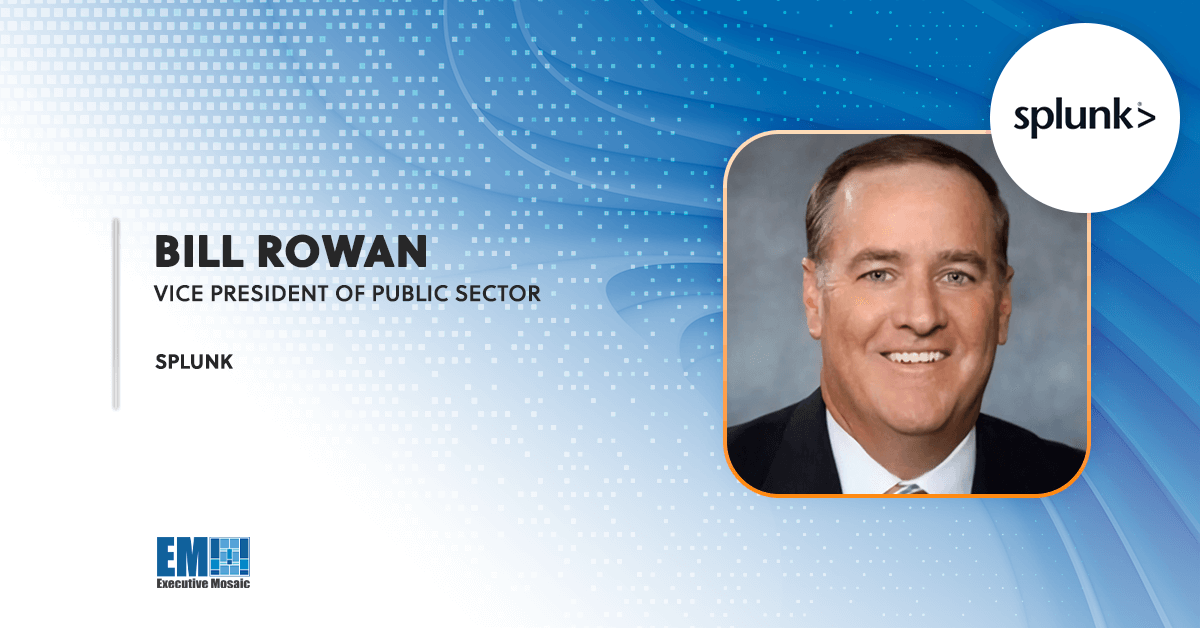What’s next for artificial intelligence in the federal landscape, and how are government leaders looking to use AI? Bill Rowan, vice president of public sector at Splunk, shared his insights about the future of AI, popular AI use cases and how AI could change the game in cybersecurity in a new Executive Spotlight interview with GovCon Wire.
Rowan is a four-time Wash100 Award winner. Read his full interview below:
GovCon Wire: Bill, when we last spoke with you, you highlighted some of the opportunities and hurdles associated with AI. Where do you think AI is headed next?
Bill Rowan: Looking ahead, a significant focus will be on solidifying the security and reliability of AI systems. As we move forward, we must assess whether we can trust the systems and evaluate their accuracy for reliable output. This scrutiny is crucial for building robust AI models that we can depend on, especially in sensitive and high-stakes environments like the public sector.
In addition, the industry is focused on integrating AI to naturally become an integral part of our everyday work experience. The goal is to integrate AI so seamlessly into our workflows that people don’t even notice it’s there, enhancing productivity and efficiency without adding complexity. By combining human expertise with advanced AI capabilities, we can navigate the complexities of our digital world more effectively and responsibly, ensuring trust and resilience in our systems.
GovCon Wire: In which applications are you seeing the highest demand for AI/ML from your federal customers, and can you explain what’s driving that demand?
Bill Rowan: In the public sector, AI/ML applications are in high demand for digital resilience efforts. I’d say the top three areas we’re seeing demand from our customers include:
- Threat Detection and Response: Specifically around anomaly detection, AI/ML algorithms help monitor network traffic and user behavior to detect unusual patterns that may indicate cyber threats. These systems identify deviations from normal activity and flag potential security incidents in real-time, helping prevent breaches.
- Predictive Analytics: AI/ML models for predictive maintenance can forecast potential failures in IT infrastructure and critical systems, allowing public sector organizations to perform maintenance proactively and thus avoid downtime and damage. This also feeds into incident prediction. By analyzing historical data, AI can forecast potential security incidents, enabling proactive measures to mitigate risks and enhance system resilience.
- Security Orchestration, Automation and Response (SOAR): AI/ML-powered SOAR platforms automate routine security tasks, such as incident response and remediation, reducing the time required to address threats and minimizing human error.
In a threat landscape where attacks continue to increase, combined with a workforce shortage, these AI/ML applications are vital for the public sector to ensure robust digital resilience.
GovCon Wire: Tell me about some of the applications you see for AI in cybersecurity? How do you think those applications will impact the future of cybersecurity?
Bill Rowan: AI applications in cybersecurity have the potential to revolutionize the field by significantly enhancing our ability to detect and manage threats. Automation of anomaly and threat detection through AI will lead to faster response times and reduce the burden on human analysts, allowing cybersecurity professionals to focus on complex tasks that require human judgment and creativity. Furthermore, AI’s predictive capabilities can enable a more proactive approach to cybersecurity, shifting further away from reactive measures commonly used today.
As AI systems become more advanced and reliable, they will provide deeper insights into cyber threats by analyzing vast amounts of data, helping develop more effective strategies to counter them. This evolution will arguably transform the cybersecurity landscape, making digital environments safer and more resilient against attacks.
GovCon Wire: Lastly Bill, tell me about Splunk’s culture and core values. What aspects of the company do you think are contributing most to its success while helping to attract and retain top-level talent in a competitive market?
Bill Rowan: At Splunk, our core values are the cornerstone of our ability to attract and retain outstanding talent. We foster a culture of innovation, encouraging our team to imagine the possibilities and stay ahead of technological advancements to meet our customers’ evolving needs. Our passion drives a steadfast commitment to providing our customers with the best experience possible. We embrace a disruptive mindset, continuously seeking new perspectives to improve our efficiency and effectiveness. We’re dedicated to maintaining an open and inclusive environment, promoting honest communication and collaboration. And we know the importance of having fun. Celebrating achievements and participating in team activities not only enhances productivity but also cultivates a positive and dynamic workplace. These values collectively define the vibrant and appealing environment at Splunk.
Additionally, with Splunk’s acquisition by Cisco, we are now even better equipped to help our customers build resilience across their entire digital footprint. This strategic move enables us to continue delivering innovative solutions and comprehensive support to meet the growing demands of the digital landscape.



